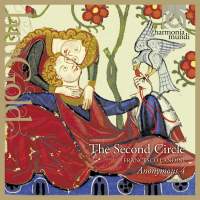Texte paru dans: / Appeared in: |
|
|
Outil de traduction |
|
|
|
|
|
Reviewer: J.
F. Weber The title of the disc, The Second Circle, refers to the place in Dante's Inferno (Hell) where carnal sinners are driven through darkness by the winds for all eternity, a gloomy way of presenting 17 ballate of Francesco Landini, the great contemporary of Dante. But it's still close enough, for songs of courtly love and a profound faith in eternal reward or punishment were equally prominent marks of 14th-century Italy (known as the Trecento). Francesco Landini (c. 1335-97) of Florence was the leading Italian composer of the century, though blind from childhood. He was a poet as well as composer, a virtuoso of instrumental playing, and organist of San Lorenzo for the last 30 years of his life. His works, like those of his contemporaries, were almost entirely secular, despite his employment, and, as the century progressed, French influences increasingly affected the style. This program offers a broadened repertoire for Anonymous 4, who have concentrated largely on sacred music from England and France (the motets of the Montpellier Codex are the most secular of their programs). They bring a remarkable purity of execution to the repertoire, rather unlike previous ensembles. Those other interpretations date back awhile, for Landini has been neglected in the CD era. My collection, far from complete, yields up songs, one or two at a time, scattered across numerous collections of the past 25 years. (One collection, Landini and His Contemporaries, gives the master only two selections.) Before that, Andres Mustonen devoted a full LP (Melodiya and Chant du Monde) to the composer in 1976, as did Thomas Binkley (Electrola Reflexe) three years earlier. An Italian ensemble has just made a Landini disc on Tactus, so new I haven't even seen it yet, just the list of contents. Since these ballate are set for two or three voices, we hear the group together only in half of the selections. The choice among the composer's 154 pieces is well balanced, for most of them are familiar from previous recordings without duplicating much on the three cited Landini discs (the new CD and the two old LPs). Gran piant'agli ochi is one of the most familiar of his pieces on disc, probably more than Echo la primavera. Five pieces appear to be first recordings (marked with an asterisk in the headnote), one (Che chos 'è quest'amor) so obscure that you will find it listed only in The New Grove 2, not The New Grove. The interpretations convey the ache of lost love and the joy (always momentary) of love not yet lost. We have heard barely a third of Landini's works on records, a deficit that some of those new Italian ensembles ought to address soon.
If you are more interested in the Trecento than in Anonymous 4's usual repertoire, you may be discovering this remarkable group for the first time. This will demonstrate, as well as any previous disc, why they reached the pinnacle of achievement early and never yielded it. The lavish booklet, full of information as well as illustrations, is typical of their output. Don't miss it. | |
|
|
|
|
|
|
|
Cliquez l'un ou l'autre
bouton pour découvrir bien d'autres critiques de CD |
|




